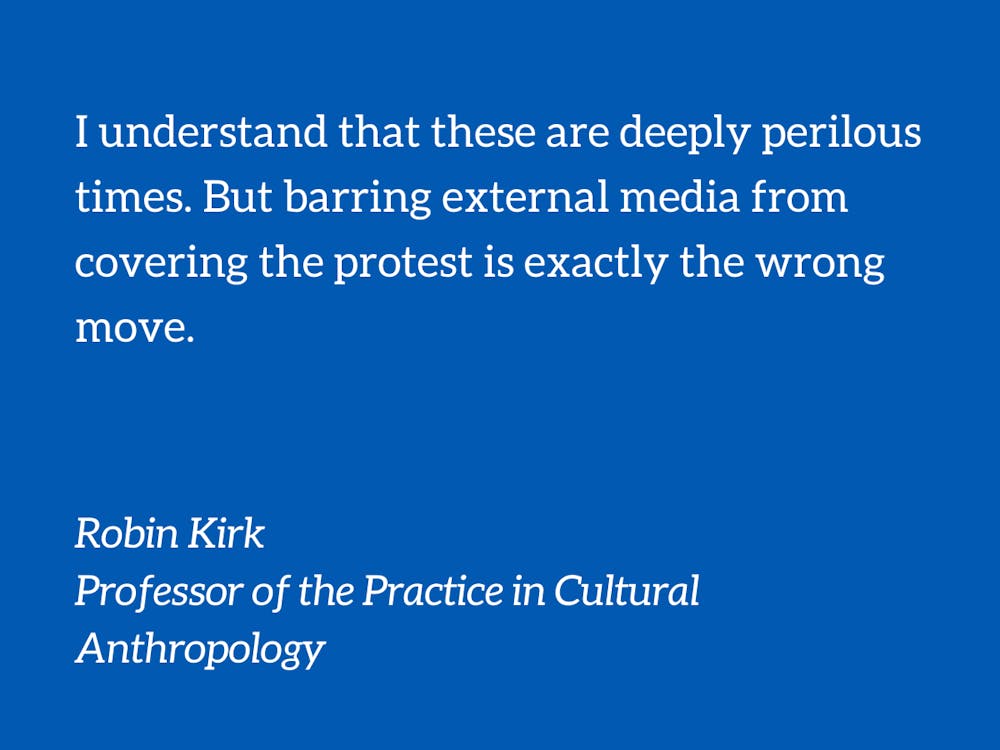Via a friend and neighbor who is a journalist, I learned that on the morning of April 17, Duke denied her permission to cover a campus National Day of Action event to support higher education. The protest was organized by students, staff and faculty.
The protest focused on the White House’s attacks on universities across the country. Organizers called on Duke to speak out forcefully in support of education, free speech and our community members who are not American citizens. The protest was a national effort sponsored by the American Association of University Professors (AAUP), hardly a fringe or radical group.
I understand that these are deeply perilous times. But barring external media from covering the protest is exactly the wrong move. Duke is a private university and can control who comes on campus. In the case of approved protests by members of our community, a generous application of that policy should be the standard. At a time when universities are rethinking how to make a robust case to the American people about their vital role in bettering society, Duke should allow reporters to cover future demonstrations.
Attacks by the Trump administration on universities like Harvard and Northwestern are shocking evidence that institutions of higher education are in an existential battle against an authoritarian regime doing everything in and out of its power to crush free speech and independent thought. In my view, they are targeting universities as part of a coordinated campaign to eliminate institutions capable of mounting substantive critique and positive alternatives.
Harvard University’s decision to stand up for its principles against threats is a model for how Duke should articulate a parallel, powerful vision for the future. Harvard, also a private university, allowed external media outlets to cover on-campus protests.
Harvard is living its values, as I hope Duke will choose to do in the future.
In this world of cell phones and whirring news helicopters, barring the media is a fiction that ends up communicating fear. Instead of standing up for our beliefs by barring the press, we look afraid and exclusionary. We need to consistently model how to engage with peaceful, nonviolent protest, in this case, organized by our students and colleagues, approved by administrators, and coordinated with dozens of other colleges and universities.
When we fail to do that, we are assisting the aims of the antidemocratic forces who aspire to eliminate institutions of higher learning like Duke.
Make no mistake. That is the Trump administration’s goal. Allegations of antisemitism are the excuses they are using not to reform, but to destroy. Curtis Yarvin is a self-proclaimed “neoreactionary,” hard-right blogger embraced by many in the White House and MAGA-aligned think tanks. Yarvin contends that Duke and other U.S. institutions of higher learning are part of “The Cathedral,” a sclerotic, out-of-touch, elitist hierarchy. In its place, Yarvin wants a monarch—or, just as useful, a billionaire freed from electoral politics and the law. In that world, universities have no place.
When we fail to live our values, we risk becoming the Cathedral Yarvin and his MAGA co-conspirators so determinedly caricature. We also send the wrong message to the communities whose support we desperately need in this fraught moment.
What I believe we should communicate is not exclusion but openness. Not separation but commitment to our community and democratic values.
Duke is rightly celebrating the 1968 “Silent Vigil” as part of the Centennial of the University’s founding. Still the largest protest in the university’s history, the Silent Vigil pressed for collective bargaining rights for AFSCME Local 77, the labor union for nonacademic employees and an end to campus racial discrimination.
Protest should be seen as emblematic of our core values, which include education and engagement with society, not something to hide away.
Recently, Dr. Jim Yong Kim visited Duke to talk about his work with Duke alum Dr. Paul Farmer. He spoke movingly about how Duke helped shape Farmer, who entered the university determined to use a medical degree to become rich and left profoundly changed.
Kim quoted Immanuel Kant’s challenge to embrace optimism as a moral duty in these difficult times. I would rephrase that to urge Duke to consider courage as a moral duty as well, to not only phrase our values but live them in our decisions.
Robin Kirk co-directs the Duke Human Rights Center at the Franklin Humanities Institute and is a Professor of the Practice in Cultural Anthropology.
Get The Chronicle straight to your inbox
Sign up for our weekly newsletter. Cancel at any time.

